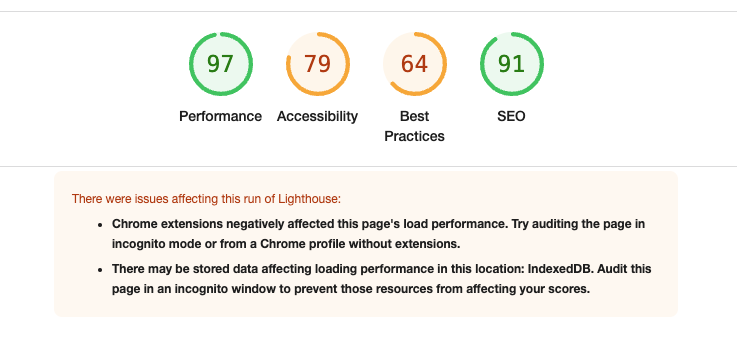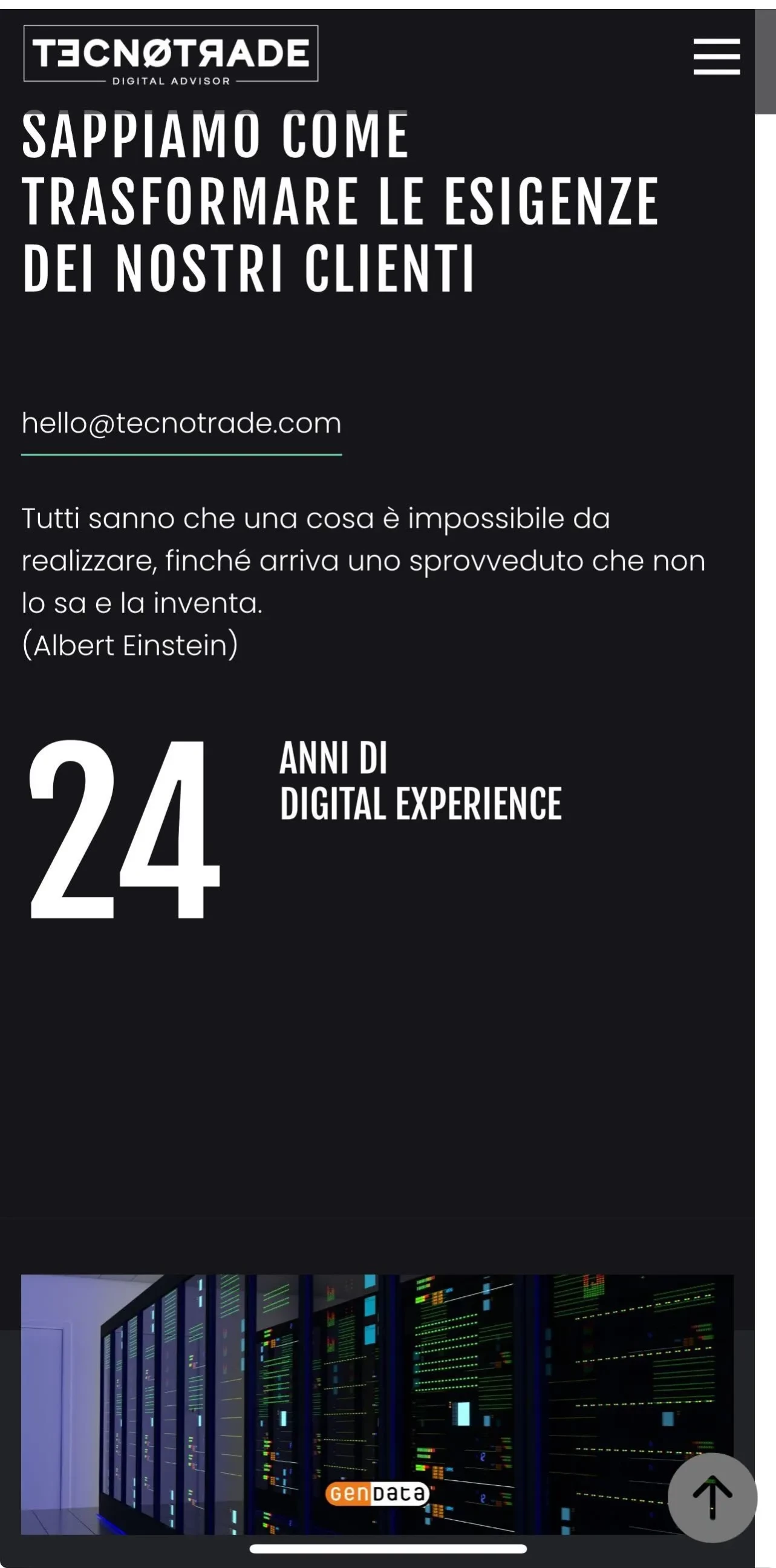Technical SEO is an essential aspect of the overall search engine optimization strategy.
It focuses on the most advanced techniques, including improving on-page code, server performance optimization, and many other technical factors that influence a website's visibility on search engines.
In today's increasingly competitive digital environment, investing in technical SEO is crucial to ensure that your website is not only easily indexable by search engines but also provides a flawless and fast user experience.
Tecnotrade offers a comprehensive technical SEO service to meet the needs of the most demanding clients.
Our team of experts is committed to optimizing every technical aspect of your website, working on the code, site structure, and server performance to guarantee maximum impact on search engine results pages (SERPs).
With our technical SEO approach, we ensure that your website not only attracts Google's attention but is also rewarded with prominent rankings in the SERPs.
Investing in high-quality technical SEO is the first step toward online success and business growth.
What is Technical SEO?
When we talk about technical SEO, we refer to all search engine optimization activities that involve technical interventions carried out directly on the website.
Although it is commonly associated with on-page SEO, technical SEO deserves to be considered as a distinct branch within search engine optimization.
Unlike on-page SEO, which mainly focuses on the content and visible elements of the website, technical SEO primarily deals with optimizing the architecture and technical structure of the site itself.
This type of optimization does not directly concern the website content but rather aims to improve the overall user experience by ensuring a cohesive and easily navigable internal structure.
Consequently, technical SEO plays a fundamental role within any search engine optimization strategy.
Technical optimization of the site not only enhances overall technical performance but also directly influences the perception and experience of the users visiting the site.
Moreover, proper technical optimization is crucial for search engines as it facilitates the work of crawlers, the bots that analyze and index the site's content.
A technically well-optimized website will be considered of high quality and relevance by search engines, increasing the chances of ranking higher in search results.
Crawlers and Technical Analysis
When evaluating the value of a website, search engine bots examine a series of technical factors closely related to technical SEO.
Optimizing these factors is not only a recommended practice but forms the foundation of an effective and integrated SEO strategy.
The technical factors analyzed by search engine crawlers are essential to improving the visibility of your web pages in search engine result pages.
To technically optimize a website, a series of specific actions must be taken.
These actions aim not only to make the site more navigable for users but also more easily scannable by search engine bots.

It is widely known that Google prioritizes websites that offer an optimal user experience.
Many aspects of technical SEO contribute to this experience, such as page load speed and mobile usability.
Similarly, a consistent and well-structured internal site architecture is rated more positively compared to a confused and disorganized one.
A website with loading speed issues, accessibility problems, or technical errors is considered low quality and consequently receives a negative evaluation from search engines.
This results in reduced visibility in the SERPs and lower chances of appearing in top positions.
Key Points of Technical SEO
Technical SEO is a broad field requiring attention to detail and careful management of numerous technical aspects.
Addressing this branch of optimization requires the ability to analyze and optimize every single element to ensure maximum impact on the website's visibility on search engines.
SSL Certificate
One of the first aspects to consider when dealing with technical SEO is site security.
It is essential to guarantee the privacy of users visiting your site's pages, which can be achieved through activating the HTTPS protocol.
The security provided by HTTPS is fundamental to protect user data during site navigation.
To enable HTTPS, it is necessary to obtain and install an SSL certificate.
However, it is not enough to get the certificate just once: it is important to ensure it remains valid over time.
If the SSL certificate expires or is not renewed correctly, the site will lose the encrypted HTTPS connection, negatively impacting search engine rankings.
It is important to emphasize that HTTPS is a ranking factor recognized by Google and other search engines.
Lack of this security level can negatively influence the site's position in the SERPs.
Therefore, keeping the SSL certificate active and valid is crucial to provide a solid technical foundation for your SEO strategy.

Sitemap
The sitemap is a fundamental element of technical SEO as it provides a detailed map of a website's structure and content to search engine algorithms.
It is an XML file listing all the site's pages along with their hierarchical relationships and priorities.
This structured representation allows search engines to better understand the site's organization and explore it more effectively.
The sitemap helps crawlers locate and index all important pages, including those that are deeper and harder to reach via traditional navigation links.
Besides providing a complete page list, the sitemap can also include additional information, such as page update frequency or last modification date.
These details allow search engines to better understand the freshness and importance of site content, influencing how often the pages are indexed.
Robots.txt File
Despite its apparent simplicity as a text file, the Robots.txt file is actually a crucial component of a solid technical SEO strategy.
It resides in the main directory of the website and provides instructions to search engine bots on how to navigate and index the site.
This file allows you to specify which pages of the site should be included in the indexing and which should be excluded.
Through a series of directives, it is possible to precisely define which parts of the site should be crawled by search engines and which should be ignored.
This granular control is essential for optimizing site visibility in search results.
A correct configuration of the Robots.txt file can help direct the crawl flow of search engine bots towards the most relevant and important pages, thus optimizing the indexing process.
At the same time, it allows excluding irrelevant or duplicate pages that might negatively affect site visibility.
It is important to note that while Robots.txt provides guidance to search engine bots, it is not a means to protect sensitive or private pages.
Other security measures, such as user authentication, should be used to protect sensitive content from unauthorized access.
URLs and Meta Tags
Other crucial elements of technical SEO affecting site ranking include URL structure and meta tags.
URLs should be well-structured and readable, giving users and search engines a clear indication of the page's position within the site.
This means URLs should be descriptive and contain relevant keywords to improve understanding of the page content.
To optimize URLs, it is important to adopt a logical and consistent structure that reflects the site's organization.
URLs must be user-friendly and easy to comprehend, thus contributing to a better navigation experience for users and improving indexing by search engines.
Similarly, meta tags play an important role in technical SEO.
These HTML code snippets provide concise information about the page's content and are used by search engines to understand the context and relevance of the content.
Optimizing meta tags, including the title, description, and keywords, can significantly influence the site's ranking in search results.
However, it is important to note that although meta tag optimization is essential for improving site visibility, this aspect is generally included in on-page SEO rather than strictly in technical SEO.
Nevertheless, proper meta tag optimization contributes to consolidating the site's technical structure and improving its overall indexing.
Website Speed
Website loading speed is a critical factor in technical SEO that can significantly impact the site's ranking on search engines.
Slow-loading websites tend to be negatively rated by search engines and may be penalized in search results.
This is because search engines increasingly prioritize user experience and consider loading speed one of the key indicators of this experience.
Slow websites not only frustrate users but also cause a high bounce rate.
Users tend to leave a site if it does not load within a few seconds, which increases the site's bounce rate.
Metrics like user time on site and bounce rate are considered indicators of the site's quality and relevance by search engines.
Search engines use this information to determine the overall quality of the site and influence its ranking in search results.
A fast and responsive website that provides an optimal browsing experience has a higher chance of ranking well in the SERPs compared to a slow and problematic site.

To improve website loading speed, various strategies can be adopted, including image optimization, file compression, reducing server response times, and minimizing CSS and JavaScript files.
Investing in website speed optimization is a fundamental step to ensure competitive search engine rankings and improve overall online visibility.
Mobile-First Factor
Website responsiveness, especially in a mobile-first context, is a crucial aspect of technical SEO requiring special attention.
With the growing use of mobile devices for internet access, it is essential that a site is optimized to offer a smooth and functional browsing experience on devices of all sizes and resolutions.
Being mobile-first means designing and developing a website with the primary goal of ensuring an optimal experience for users accessing via mobile devices, such as smartphones and tablets.
This implies not only simply adapting the site layout to screen sizes but also deeper considerations on usability and ease of navigation on touch devices.
Search engines, including Google, increasingly emphasize mobile responsiveness as a ranking criterion.
A website not optimized for mobile devices risks being penalized in SERP rankings, as search engines favor sites offering a consistent and high-quality user experience across all devices.

Optimizing site responsiveness for mobile devices requires adopting responsive development practices and performance optimization to ensure fast loading times even on mobile connections.
This includes image optimization, file compression, reducing server response times, and removing non-essential content for mobile devices.
Additionally, it is important to regularly test the site on a variety of devices and resolutions to ensure a uniform and satisfactory user experience across all devices.
Investing in mobile responsiveness optimization not only improves the site's ranking on search engines but also enhances the overall user experience, contributing to the long-term success of the website.
Why Choose Tecnotrade for Technical SEO Consulting
Our experience and expertise in SEO consulting allow us to decisively address all aspects related to your website's technical SEO.
This includes a wide range of issues, from indexing challenges to loading speed optimizations and much more.
One of the main tasks of technical SEO is to ensure your website is properly indexed by search engines.
This means making sure all relevant pages and content are correctly read and interpreted by search engine crawlers.
We tackle any indexing problems your site might encounter, identifying and resolving obstacles that may prevent search engines from effectively reaching and indexing your site.
Additionally, we actively work on optimizing your website's loading speed.
Slow loading speed can negatively impact both user experience and search engine rankings.
We work to identify and fix any technical issues slowing your site down, implementing performance optimization strategies to ensure fast loading times and smooth navigation for users.
Our goal is to improve your site's ranking on Google and maximize your chances of online success.
We use personalized approaches and targeted strategies to address your site's specific needs and industry requirements. We are here to help you achieve tangible and lasting results through professional and results-oriented SEO consulting.
Contact us now for a personalized consultation and discover how we can help you achieve your online visibility and organic traffic growth goals.
We are ready to be your trusted partner in the SEO world.



